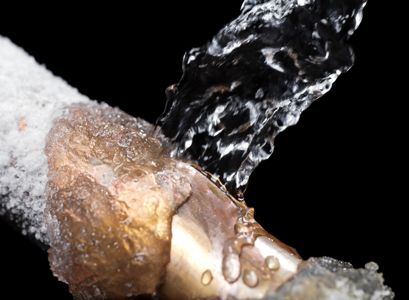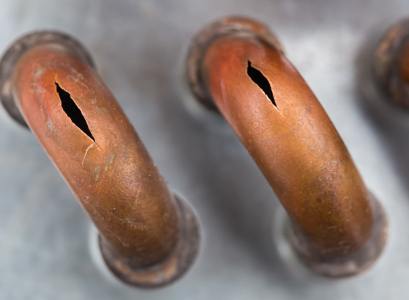Frozen or burst pipes
See how to check whether you have a frozen or burst pipe and what to do if you do.
When the outside temperature drops below zero, unprotected pipes and dripping taps can freeze and crack. This can affect your water supply.
When the temperature rises again, these cracked pipes can then leak, causing damage which can be costly to repair.
Check for frozen pipes
If one or more of your taps has stopped working, check with your neighbours to see if they are also experiencing issues. If they are then there may an issue with the water supply. If they are not experiencing issues you may have a frozen pipe.

What to do if you have a frozen pipe
Turn off the water supply
This will limit the amount of leakage or damage if a pipe bursts:
- Find and turn off your inside stop valve
- Turn off the stopcock in your cold water tank, usually located in the attic
Locate the pipe
- Check the water pressure in appliances such as taps and toilets to see if it is lower than usual
- Locate the general area where you think there may be a frozen pipe
- Check for visible pipes that are not insulated, pipes that feel much colder than others, have nearby draughts or damage
- Turn on nearby cold taps to relieve pressure on the frozen pipe - NEVER turn on the hot taps
Thaw the pipe
- If the pipe and fittings are not cracked or broken, you can try gently thawing the pipe
- Protect or move anything which might be damaged if the pipe bursts when thawed
- Use a hairdryer on the lowest setting to gently warm the pipe, starting at the end nearest the tap
NEVER attempt to thaw out frozen pipes by switching on your immersion, central heating, blow torch etc.

What to do if you have a burst pipe
Limit the damage
- Turn off the water supply as instructed above
- Drain the system by turning on all the cold water taps and flushing the toilets
- Switch off the central heating and immersion. If you use solid fuel, let it die out
- When the water heating is completely off, turn on the hot taps to further drain the system
- If water from a burst pipe is leaking near any sockets, switches or appliances, switch off the mains if it is safe to do so. If the switch is wet, do not touch it, instead call a qualified electrician
- If you have a shared water supply e.g. if you live in an apartment complex, ensure you have access to the stop cock. This is usually located where the water supply enters the building
- Check with your neighbours that turning off the water has not affected their supply
Get it repaired
- You can make a temporary repair to a burst pipe by binding it tightly with a cloth or tape.
- Replace this as soon as possible by a permanent repair, carried out by a qualified and registered plumber.
- Ensure your hot water system is refilled BEFORE you switch back on your immersion or boiler.
Prevent frozen and burst pipes - visit our Winter Proofing page for tips.